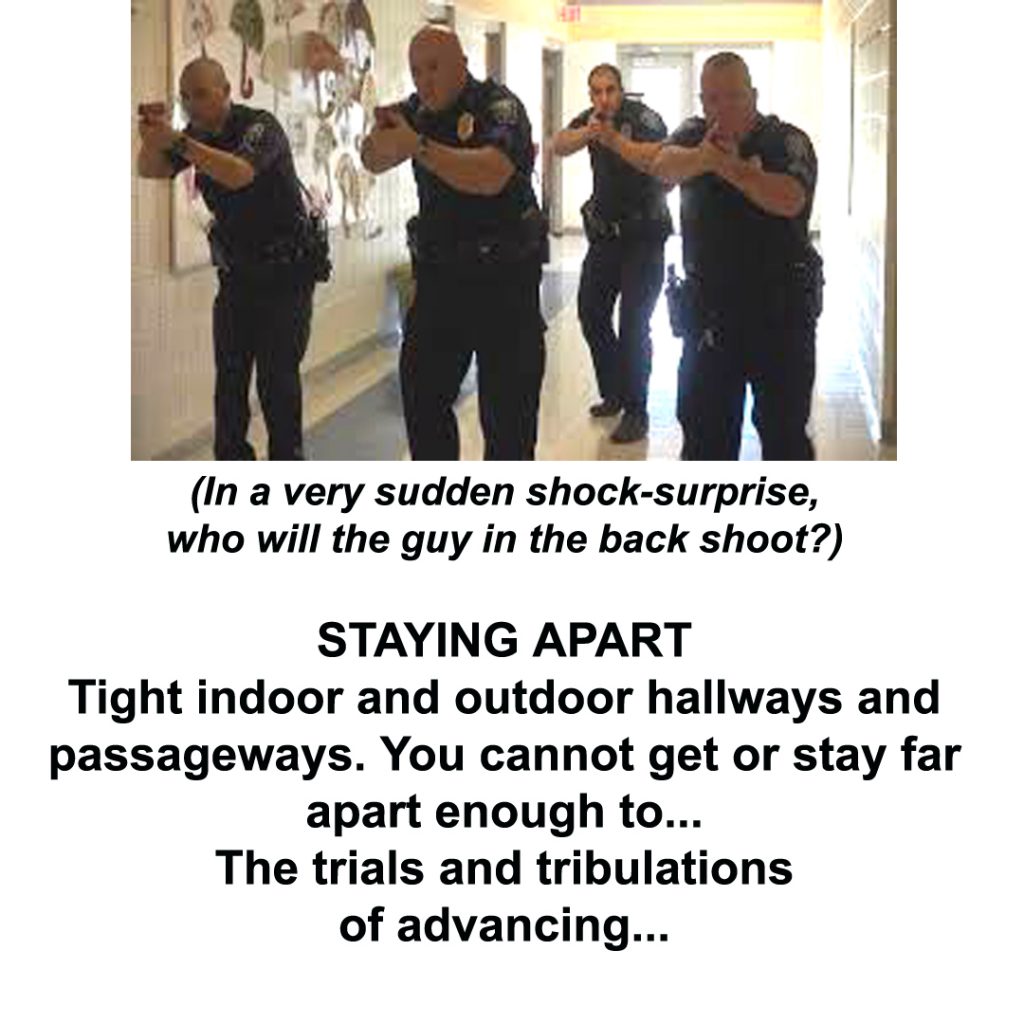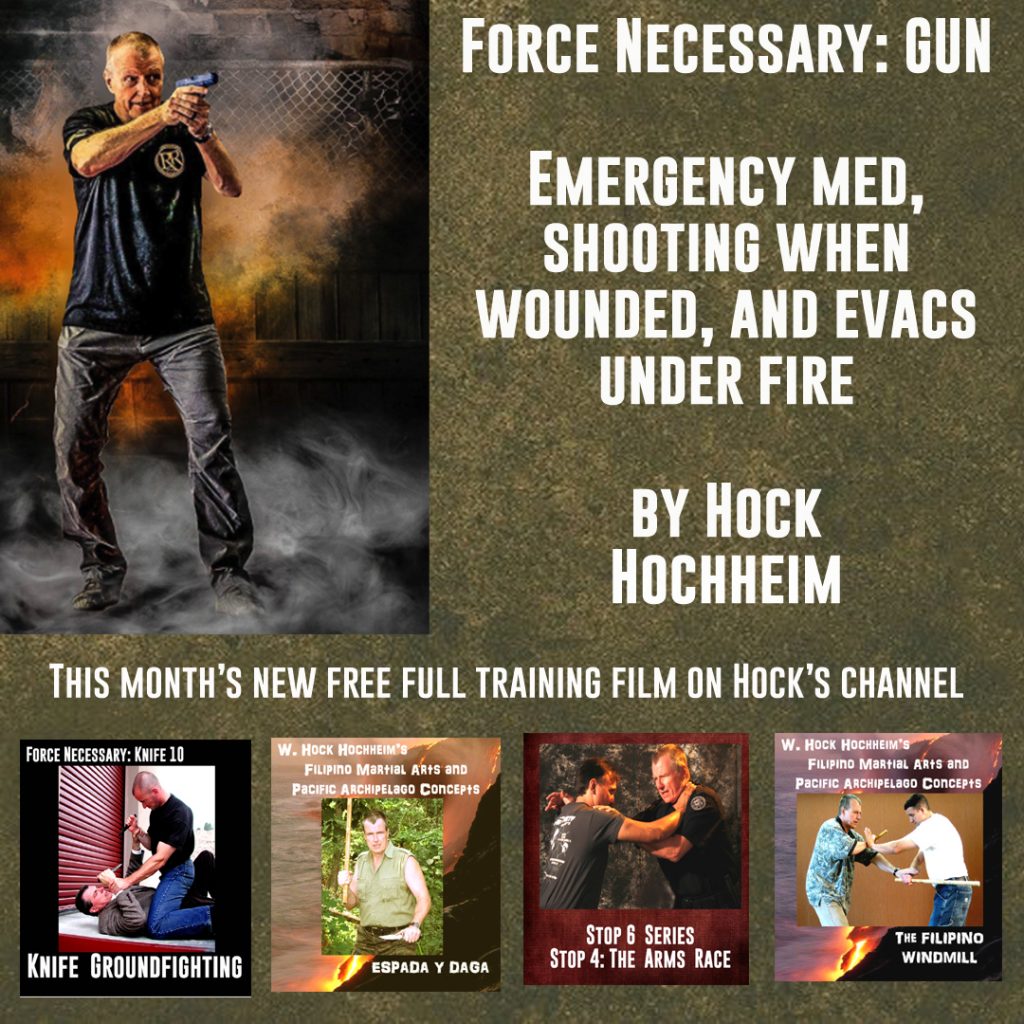
I am full of old-school mainstays. Some I like. Some I don’t. In military training tips – I was in at the tail-end of Vietnam and went through Basic Training in Fort Polk , LA. Dubbed “Little Vietnam” for its weather, look and occasional “swampiness.” “Tigerland.” We were advised to stay a machine gun burst apart when maneuvering around. At times even a hand grenade blast apart if space allowed. Plus, distance apart opens up fields of vision and fields of fire. Ralph on the far right sees more than Jimmy on the left, and vice versa. (Jody is at home with your wife or girlfriend, there ain’t no use in looking back!) But, these very generic distance tips makes you think about moving formations of two or more troops. There was a lot of fire and maneuver with cover fire lessons to advance when seemingly un-advanceable.
In the old police academies, we were told to stay at least “one shotgun blast” apart. Okay, as they were not overly-worried about machine guns or like…bazookas. What about semi-auto pistols? They can spray pretty damn fast too, kinda like a machine gun burst.
So still, police, military or civilian common sense, staying apart if possible is a good generic plan. If you can. But in narrow hallways, passageways and tight spots of life, often there is no space to spread. Always risky.
I wonder, is the distance idea emphasized today like the olden days, though? Today (like many recent years) there seems to be a lot of clumping taught, even when there is space to un-clump. Sometimes you can’t. Take a look at the associated photo . A hallway. Not much space to spread. Narrow hallways, passageways and tight spots, no space to spread. Always risky. But now consider the guy in the back. The guy in the back might shoot the guy (or guys) in the front if the feces suddenly hits the proverbial fan. Some of these formations have the guy in the back, walking backwards! That’s some serious “6 Watching” right there. And not a terrible idea at all.
Or line-ups. Is trudging single file in a SWAT line some form of clumping? Lots of SWAT folks line up like toy soldiers to get from the staging area, say, van point A to point B doorway. It’s an efficient way to move, yeah. I could tell some interesting stories in sims classes about that. But I always wondered that in a world of planned terrorists and bad guys, after they have worked on a hostage deal or raid, or robbery, do they ever say to each other,
- “Okay, now…where will SWAT park?”
- “Where will the response team stage?”
- “Where will the Bradley stage?”
Bombs and snipers are next to thwart the good guys from the get-go. Reminds me of the great L.A.P.D. SWAT plank member Scott Reitz recalling, when the van doors opened up once, he instantly had to shoot an armed bad guy right there at the doors! In my city, if any residents of bad neighborhoods saw the SWAT team van driving anywhere day or night, cell phones would light up with warnings. “SWATs out!”
Getting there. Getting into position. Sometimes just to encircle and guard-watch via a perimeter, toss in the phone? Or gain entry into buildings? SWAT has become very efficient “room-raiders,” perhaps at the expense of “open-field” crossing training, ignoring Point A to be Point B transit training worries? Does getting there sometimes mean crossing open spaces under sudden or known fire? Cover fire is an advancement solution but a tricky thing in the civilian world, Cover fire as in the right side laying down a field of fire so the left side can advance, then vice-versa. I’ve had a number of SWAT commanders and police admin say, “no way” to firing for such cover. Taboo. You either justifiably shoot directly at a bad guy or you can-not, do-not take any shot at all. (I do think there can be very controlled cover fire, but the generic response is no to the concept. (I still teach the concept to all with simulated ammo, and the subject of another essay.)
Anyway, citizens, police, military! To clump or not to clump? That be the question. One Shakespeare never pondered. But I wish more people would think about it.
